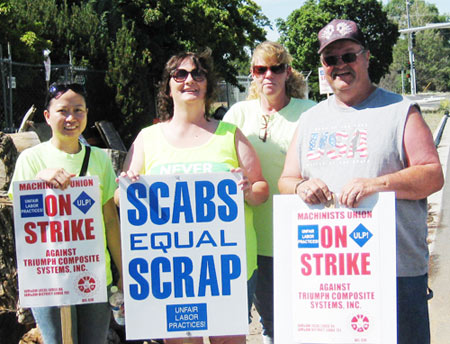
Vol. 80/No. 24 June 20, 2016
(front page)
‘We’re fed up with two-tier pay,’ say aerospace workers

The 400 members of International Association of Machinists Local 86 are fighting to restore pensions for newer workers and end a two-tier wage scale imposed by the company three years ago. They are also opposing the company’s proposal to remove the cap on workers’ insurance costs. The plant produces components for Boeing aircraft interiors.
Picketing June 4, machinist Dwight Devine wore a union T-shirt that read “One equal team,” opposing the two-tier wages the company imposed in 2013 after union members rejected a concession contract but voted not to strike. New hires start at a significantly lower rate and never reach the pay of more senior workers. “The company says it has to cut costs,” Devine said. “It’s inconceivable for them to take a pay cut or to cut their profit margin.”
The same contract replaced pensions with a 401(k) retirement savings scheme for workers hired after 2013.
On June 1 the company published an “Open letter to our employees and the Spokane community” in the Spokesman Review, in which it defended its course and declared its willingness to talk to the union.
The IAM sent the company a letter saying it should contact the union, not the newspaper, if it was ready to talk.
On June 6 signs on the picket line that read “Lockout” replaced the signs reading “Strike.” Steve Warren, the business agent for Local 86, told the Militant the union has filed charges with the National Labor Relations Board accusing the company of unfair labor practices. “We believe this will result in a determination that this is a lockout,” he said.
Triumph Group Director of Corporate Communications Michele Long told the Militant the company had no comment.
Unionists say members of the National Association of Letter carriers, United Steelworkers and the engineers’ union SPEEA, as well as nurses, teachers and others visit their picket lines. Local businesses donate water and food.
The IAM 751 District Council based in Seattle, which includes workers at Boeing, contributed $100,000 to a hardship fund for the Triumph workers.
“This fight is about stopping the erosion by management of unions across the country,” said mechanic Greg Buckles. For the past year, he said, workers in the plant have been wearing union buttons that read, “Have you started your independent strike fund?” in preparation for the strike.
The company also prepared, and has brought in replacement workers. Every morning at shift change, unionists line up at the plant gate as five or six partially filled buses of strikebreakers roll in.
“We are solid. We are finally tired of the way they treat the workers. Getting back pensions is the number one issue,” said Ryan Van Valkinburgh, 38, an assembler in the plant. “We also don’t want the two-tier wages and the health care costs with no limit. And we definitely don’t want our jobs going to Mexico.” He was referring to the fact that Triumph has moved some work from Spokane to its plant in Mexico.
Sue Six, 52, has worked at the plant for three years and assembles ducts. “In 1999 I went to the World Trade Organization protests in Seattle,” she said. “I’ll never forget a woman from Mexico who gave a speech about the conditions workers face there, including $2 a day wages. How can you live on that? That’s why we can’t be saying foreign workers are ‘taking our jobs.’ We should welcome them and stick together.”
“In a way I have to thank the company for the strike and bringing us together. Before I didn’t know these people’s names or where they worked,” Six said, indicating other pickets. “Now we talk every day. Now we are stronger.”
Related articles:
Oregon oil train crash highlights danger of smaller crew
On the Picket Line
Farmworker convention discusses fights to build union
Front page (for this issue) | Home | Text-version home